Ditapis dengan
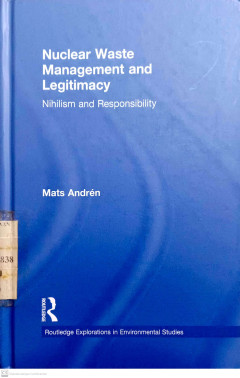
Nuclear Waste Management and Legitimacy: Nihilism and Responsibility
This text focuses on nuclear waste management, which can work in democratic countries only if viewed as legitimate by the population. The book posits the inability of democracies to establish such legitimacy as an explanation for the current absence of public policy decisions that can identify a solution.
- Edisi
- -
- ISBN/ISSN
- 9780415696920
- Deskripsi Fisik
- 110 p. : illus. ; 24 cm
- Judul Seri
- -
- No. Panggil
- 539.7 AND N
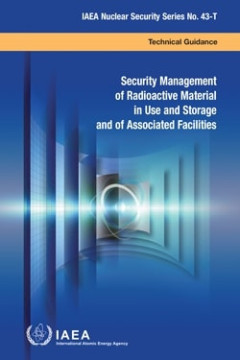
Security Management of Radioactive Material in Use and Storage and of Associa…
The IAEA Nuclear Security Series provides international consensus guidance on all aspects of nuclear security to support States as they work to fulfil their responsibility for nuclear security. The IAEA establishes and maintains this guidance as part of its central role in providing nuclear security related international support and coordination. The IAEA Nuclear Security Series was launched in…
- Edisi
- -
- ISBN/ISSN
- 978–92–0–118321–7
- Deskripsi Fisik
- 68 p
- Judul Seri
- IAEA nuclear security series
- No. Panggil
- 620.267:343.852 IAE s
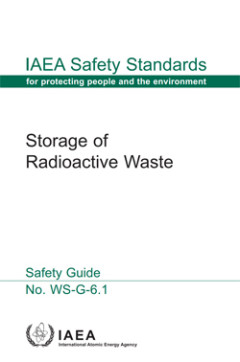
Storage of Radioactive Waste, Safety Guide
Radioactive waste is generated in a broad range of activities involving a wide variety of radioactive materials associated with, for example, the operation of nuclear facilities, the use of sealed radioactive sources in industry, the use of human made radionuclides in hospitals and laboratories, and the decommissioning of such facilities. The physical, chemical and radiological characteristics …
- Edisi
- -
- ISBN/ISSN
- 9201067062 / 1020525X
- Deskripsi Fisik
- 55 p. : Illus. ; 24 cm
- Judul Seri
- Safety Standards Series No. WS-G-6.1
- No. Panggil
- -
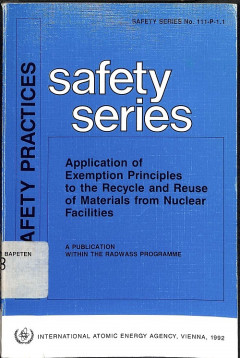
Application of Exemption Principles to the Recycle and Reuse of Materials fro…
This Safety Practices publication, a part of the lAEA’s Radioactive Waste Safety Standards (RADWASS) programme, provides guidance on those application of internationally agreed principles for determining those levels of radionuclides in materials below which they can be exempted from regulatory control and can be recycled or reused without any further restriction. lt illustrates a methodology…
- Edisi
- -
- ISBN/ISSN
- 9201049927 / 00741892
- Deskripsi Fisik
- 204 p. : Illus. ; 24 cm
- Judul Seri
- Safety Series No. 111-P-1.1
- No. Panggil
- 621.48 IAE a
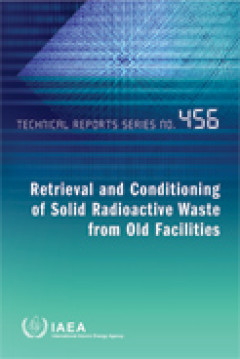
Retrieval and Conditioning of Solid Radioactive Waste from Old Facilities
This report provides information and discussion on planning, methodologies and technologies for retrieval and reconditioning of radioactive wastes recovered from old, inadequate disposal or storage facilities. The objective is to improve waste safety and security in accordance with modern requirements. Selected international experiences in waste retrieval and recovery projects are included. The…
- Edisi
- -
- ISBN/ISSN
- 9201124066 / 00741914
- Deskripsi Fisik
- 161 p. : Illus. ; 24 cm
- Judul Seri
- Technical Reports Series No. 456
- No. Panggil
- -
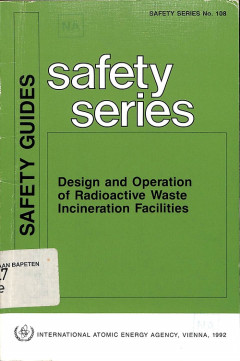
Design and Operation of Radioactive Waste Incineration Facilities, Safety Guides
This book consist : Introduction; Design and operational objectives; Basic sadety aspects; System requirements; Conceptual design; Subsystem rquirements; Component requirements; Controls and instrumentation; Building and physical arrangement; System testing and commissioning; System operation; and Documentation. (Jml)
- Edisi
- -
- ISBN/ISSN
- 9201032927 / 00741892
- Deskripsi Fisik
- 66 p. : Illus. ; 24 cm
- Judul Seri
- Safety Series No. 108
- No. Panggil
- 539.7 IAE d
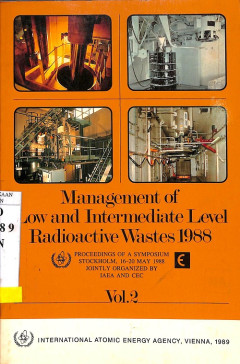
Management of Low and Intermediate Level Radioactive Wastes 1988, Vol. 2: Pro…
Proceedings contains material Treatment and conditioning of liquid wastes (Session 6); Disposal and safety assessment (Poster Session 1); Waste Characterization and acceptance criteria (Poster Session 2); and Treatment and conditioning of radioactive wastes (Poster Session 3). (Jml)
- Edisi
- -
- ISBN/ISSN
- 920020189X / 00741884
- Deskripsi Fisik
- 313 p. : Illus. ; 23 cm
- Judul Seri
- Prosiding IAEA
- No. Panggil
- 363.7289 PRO m v.2
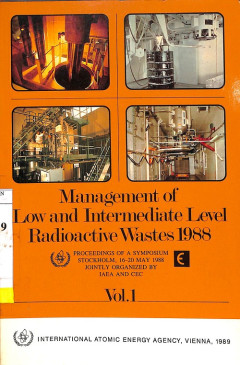
Management of Low and Intermediate Level Radioactive Wastes 1988, Vol. 1: Pro…
Proceedings contains material National, and international waste management programmes and policies (Session 1); Disposal options and performance and safety assessment (Session 2); Waste characterization, quality control and acceptance criteria (Session 3); Treatment and conditioning of mixed hazardous wastes and institutional wastes (Session 6). (Jml)
- Edisi
- -
- ISBN/ISSN
- 9200200893 / 00741884
- Deskripsi Fisik
- 459 p. : Illus. ; 23 cm
- Judul Seri
- Prosiding IAEA
- No. Panggil
- 363.7289 PRO m v.1
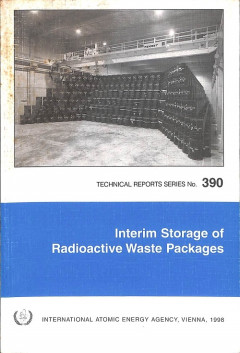
Interim Storage of Radioactive Waste Packages
This book consist : Introduction; Safety principles and requirements for waste package storage; Production of waste packages; Storage facilities; Operational experience and optimal storage practices; Waste package management options after the licensed storage period; Recommended measures to ensure optimal performance of waste packages during storage; and Conclusions. (Jml)
- Edisi
- -
- ISBN/ISSN
- 9201036981 / 00741914
- Deskripsi Fisik
- 90 p. : Illus. ; 24 cm
- Judul Seri
- Technical Reports Series No. 390
- No. Panggil
- -
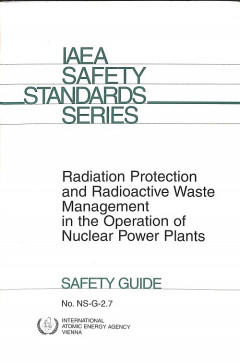
Radiation Protection and Radioactive Waste Management in the Operation of Nuc…
This book consist : Introduction; Applicable requirements and objectives; Radiation protection programme; Programme for radioactive waste management, including control of discharges; Training; and Records. (Jml)
- Edisi
- -
- ISBN/ISSN
- 9201192029 / 1020525X
- Deskripsi Fisik
- 63 p. : Illus. ; 24 cm
- Judul Seri
- Safety Standards Series No. NS-G-2.6
- No. Panggil
- -
 Karya Umum
Karya Umum  Filsafat
Filsafat  Agama
Agama  Ilmu-ilmu Sosial
Ilmu-ilmu Sosial  Bahasa
Bahasa  Ilmu-ilmu Murni
Ilmu-ilmu Murni  Ilmu-ilmu Terapan
Ilmu-ilmu Terapan  Kesenian, Hiburan, dan Olahraga
Kesenian, Hiburan, dan Olahraga  Kesusastraan
Kesusastraan  Geografi dan Sejarah
Geografi dan Sejarah